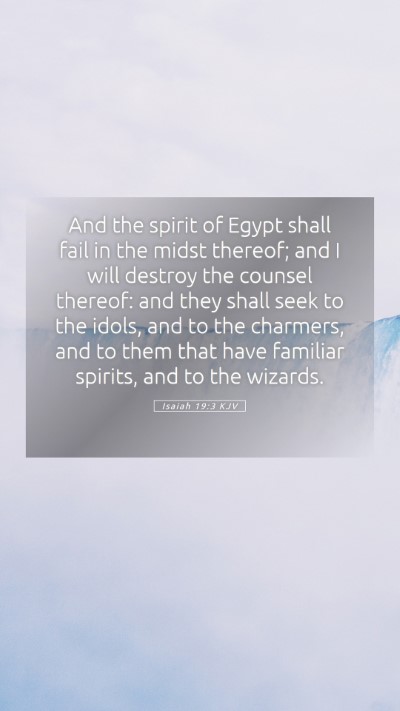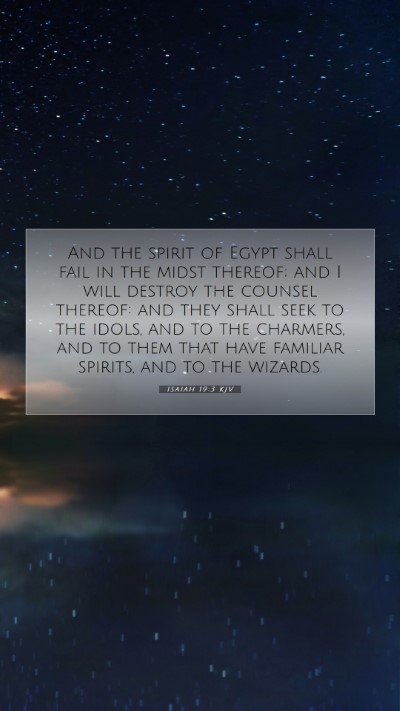Understanding Isaiah 19:3
Isaiah 19:3 states: "And the spirit of Egypt shall fail in the midst thereof; and I will destroy the counsel thereof: and they shall seek to the idols, and to the charmers, and to them that have familiar spirits, and to the wizards."
This verse provides a profound insight into the spiritual state of Egypt during the time of the prophet Isaiah. To grasp the meaning and implications of this passage, we can draw perspectives from esteemed public domain commentaries including those by Matthew Henry, Albert Barnes, and Adam Clarke.
Contextual Background
The Book of Isaiah was written during a time of significant turmoil and upheaval for both Israel and the surrounding nations. Egypt, a symbol of worldly power and wisdom, often represented rebellion against God and reliance on human strength. This passage highlights a time when Egypt’s internal stability and reliance on false gods would fail.
Verse Interpretations
-
Matthew Henry's Commentary:
Henry notes that the "spirit of Egypt" denotes the pride and strength derived from their wisdom and military might. The failure of their counsel suggests a divine judgment where earthly wisdom is rendered useless. Egypt will turn in desperation to witchcraft and idolatry, illustrating the futility of relying on anything other than God.
-
Albert Barnes' Notes:
Barnes elaborates on the notion that Egypt is doomed to seek help from sorcery and occult practices when faced with calamities. This signifies a departure from true faith and reliance on God, thus inviting God’s judgment. The reference to "wizards" and "familiar spirits" illustrates the extent of their folly, as they ignore divine help in favor of false and deceptive beliefs.
-
Adam Clarke's Commentary:
Clarke emphasizes the inevitability of Egypt’s decline due to their persistent idolatry and neglect of God. According to Clarke, the inhabitants of Egypt, in their fear and confusion, will succumb to a mindset that seeks guidance from the supernatural, illustrating mankind’s tendency to turn to non-divine sources in times of crisis.
Spiritual Lessons and Application
Reflecting on Isaiah 19:3, we learn that human wisdom and strength are ultimately inadequate in the face of God’s power. This passage serves as a warning against the allure of substituting true faith with other sources of guidance and security. For believers today, it underscores the importance of relying on God rather than the shifting sands of worldly advice or practices.
Key Insights for Today's Believers:
- The futility of idol worship and reliance on false sources—reminding us to anchor our faith in God.
- The acknowledgment of human limitations and the recognition of divine sovereignty in our lives.
- A call to turn away from contemporary forms of spiritualism that mirror the occult practices mentioned in this verse.
Related Bible Cross References
- Exodus 7:11-12 - The Egyptian magicians replicate Moses' signs.
- Jeremiah 46:25 - A prophecy against Egypt’s confidence in false gods.
- Isaiah 47:12-14 - A denunciation of Babylon’s reliance on sorcery.
Conclusion
Isaiah 19:3 serves as a rich source for understanding the limits of human knowledge and the consequences of turning away from faith in God. Through careful scripture analysis and biblical exegesis, we can appreciate the depth of this warning and apply its wisdom to our daily lives. As we engage in our Bible study groups or online bible study courses, we can use this verse to initiate discussions on the nature of true faith and the importance of divine guidance.


